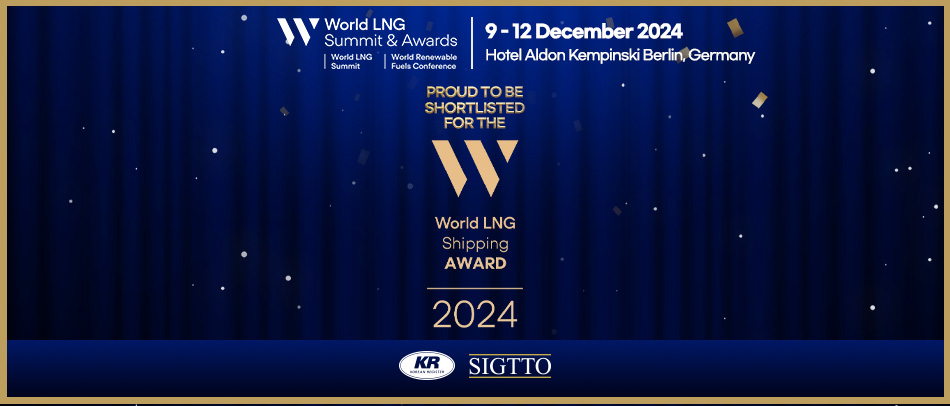Inside KR
KR Decarbonization Magazine
VOL.09 | WINTER 2024
KR Publishes Report on Safe Maritime
Transport of Electric Vehicles on PCTCs
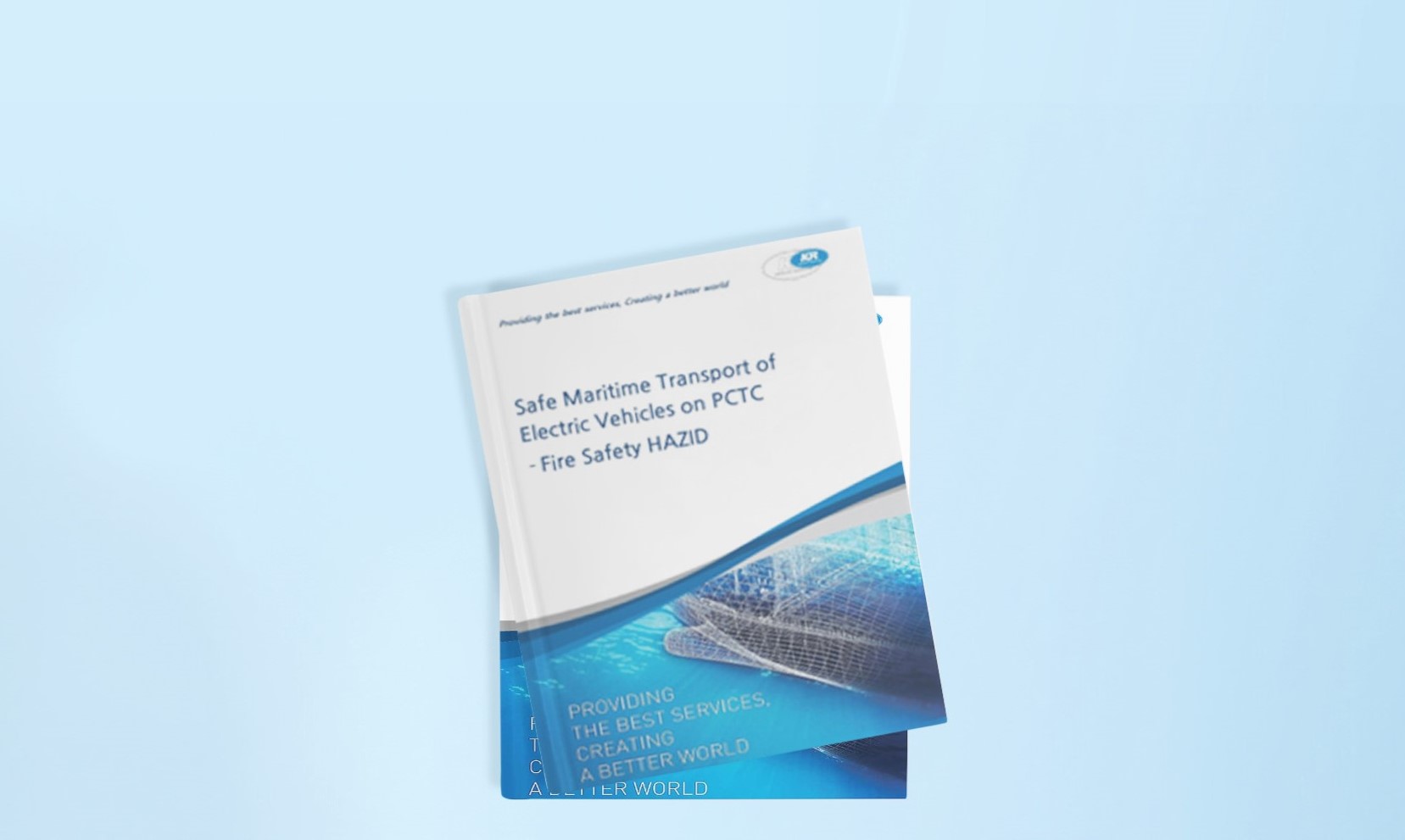
KR has published a report on the safe maritime transport of electric vehicles on Pure Car and Truck Carriers (PCTC).
Electric vehicle fires are known to be difficult to extinguish completely once they occur. This is particularly concerning for PCTCs, which transport a large number of vehicles, including electric vehicles, as a fire could lead to a major accident. To address these concerns, KR held a HAZID (Hazard Identification) workshop in early 2024, inviting experts from various fields, including PCTC operators, shipyards, and the National Fire Research Institute, to discuss fire safety management of electric vehicles transported by PCTCs.
The newly published report compiles expert opinions from the HAZID workshop and outlines the fire hazards associated with electric vehicles on PCTCs. It provides a comprehensive review of recommendations to consider during ship construction and operation, aiming to enhance fire safety for electric vehicles transported on PCTCs.
KIM Yeontae, Executive Vice President of KR’s Technical Division, commented, “We expect this report to serve as a valuable guideline for PCTC operators and shipyards. KR will continue to provide technical services to support the safe construction and operation of ships.”
The “Safe Maritime Transport of Electric Vehicles on PCTCs” report is available for public access on KR’s official website.
KR, HD KSOE, HD HHI, KSS Line, and
Liberian Registry Partner to Develop Safety
Guidelines for Ship-to-Ship Ammonia Bunkering

A landmark partnership to develop the safety guidelines for ship-to-ship ammonia bunkering has been established through a Memorandum of Understanding (MOU) between KR, HD Korea Shipbuilding & Offshore Engineering (HD KSOE), HD Hyundai Heavy Industries (HD HHI), KSS Line, and the Liberian Registry.
As the demand for ammonia-fueled vessels rises, this partnership aims to establish robust safety standards for STS ammonia bunkering, an efficient method for supplying fuel to ammonia-fueled vessels. The safe bunkering of alternative fuels, like ammonia, requires rigorous risk assessment and the establishment of controlled zones. While standards for LNG and methanol bunkering have already been defined through various international industry standards, ammonia currently lacks relevant guidelines, highlighting the urgent need for the partnership’s research.
To address this industry need, the five organizations involved will work together to develop standardized safety procedures that will set international benchmarks for ship-to-ship ammonia bunkering.
As part of the initiative, HD KSOE will perform risk assessments aligned with international industry standards, while HD HHI and KSS Line will utilize their expertise and experience in alternative-fuel vessels and ammonia carriers to evaluate controlled zones and safety procedures for ammonia STS bunkering. KR will verify the compliance of these safety procedures and issue an Approval in Principle (AIP) certificate. The Liberian Registry, overseeing the world’s largest registered fleet, will further review the validity of these safety procedures.
KIM Yeontae, Executive Vice President of KR’s technical division, commented, “With the expected rise in ammonia bunkering demand driven by the construction of more ammonia-fueled vessels, this collaborative effort to establish safety standards is highly significant. Through this partnership, KR is committed to advancing ammonia fuel technology and supporting the industry’s decarbonization efforts.”
KIM Jungsik, Managing Director of the Korea Office at the Liberian Registry, stated, “Just as we observed with the initial adoption of LNG STS bunkering, it is critical to establish regulations and procedures for ammonia as well. Our Innovation and Energy Transition team will thoroughly review the safety protocols and support the development of international standards.”
KR Awards AiP for Eco-Friendly
Hybrid CTV for Offshore Wind Farms
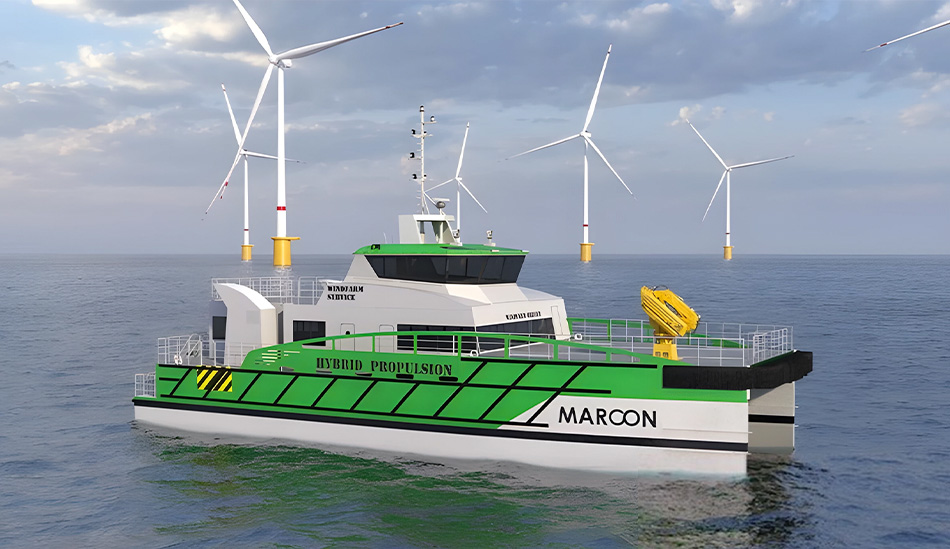
KR has granted Approval in Principle (AIP) for the Crew Transfer Vessel (CTV), a passenger and cargo transport vessel dedicated to offshore wind farms, developed by MARCON, a Korean maritime service company.
What is CTV?
CTV is widely used in Europe for transporting workers and
equipment necessary for offshore wind farm construction
and maintenance.
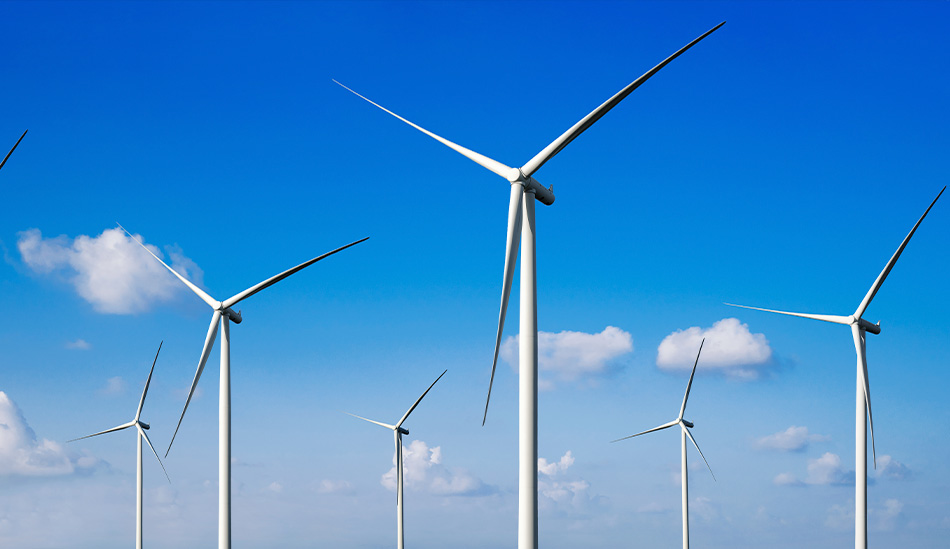
A Shift Toward Sustainability
While the conventional models rely on
diesel engines, the new CTV adopts an
eco-friendly hybrid electric propulsion
system. This is designed for addressing
environmental regulatory issues, as well as
offering fuel cost savings and supporting
safer operations of offshore wind farms.
Key Technologies
· Immersion-type Energy Storage System (ESS):
The ESS, provided by Hanwha Aerospace, employs
an immersion-type lithium-ion battery. This design
enhances insulation strength, improves cooling
efficiency, prevents thermal runaway transfer,
and ensures safety against fire with a smothering
extinguishing function.
· Linear Jet: This eco-friendly propulsion system, provided by YusinHR, boasts an efficiency rate of up to 70% and is capable of achieving speeds of 25 knots.
Expectation
This CTV is expected to reduce operating time by
approximately 34% and cut carbon dioxide emissions
by around 70% compared to traditional internal
combustion engine vessels.
KR conducted a thorough review to verify the CTV’s design safety and compliance with both domestic and international regulations. The construction of this innovative CTV began at a Korean shipyard in September 2024, with plans for its launch scheduled for 2025.
KR, Stepping into Advanced Nuclear-Maritime Applications with NEMO
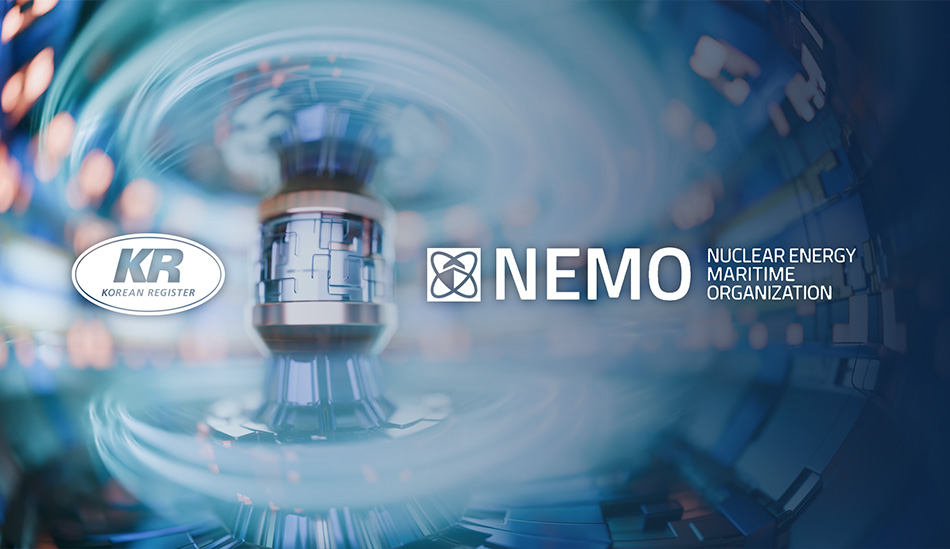
KR recently joined the Nuclear Energy Maritime Organization (NEMO) as a full member, strengthening its commitment to safe and ecofriendly maritime solutions.
NEMO, founded in March 2024 with headquarters in London, aims to develop global standards and regulations covering the deployment, operation, and decommissioning of nuclear energy in the maritime sector.
This organization brings together a wide range of global leaders including Westinghouse Electric Company, TerraPower, and HD Korea Shipbuilding & Offshore Engineering Co., Ltd. (HD KSOE), along with insurers, shipowners, classification societies, and energy companies. Members will collaborate to ensure the highest levels of safety and security in emerging nuclear technologies and develop international standards and regulations.
Amid rising carbon mitigation demands, Small Modular Reactors (SMRs) are gaining momentum as a potential solution for greenhouse gas reduction in the maritime industry, while Advanced Reactor (AR) technology is also drawing significant interest. The anticipated commercialization of marine SMR technology promises both decarbonization efforts and a stable, sustainable energy source.
Through its NEMO membership, KR will play a role in establishing international regulatory frameworks for maritime nuclear technology and will continue its efforts to provide innovative, sustainable solutions for the industry.
KR Shortlisted for
'The World LNG Shipping Award 2024'
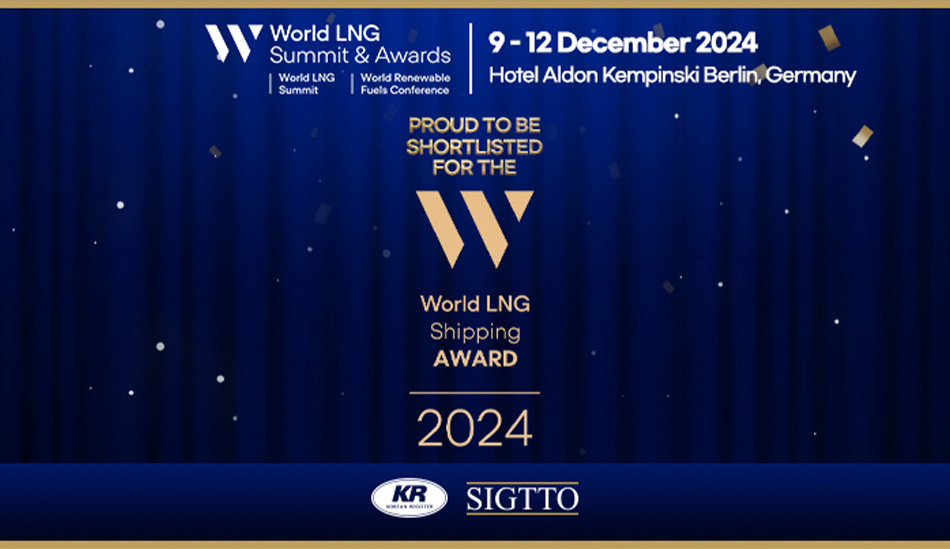
KR was shortlisted for The World LNG Shipping Award 2024 at the 24th World LNG Summit & Award, held in Berlin, Germany, from December 9 to 12, 2024.
The World LNG Shipping Award is a prestigious honor granted to companies or organizations that demonstrate exceptional innovation and contributions to the global LNG shipping industry. KR’s nomination highlights its pivotal role in spearheading the revision of the IGC Code's cargo tank filling limit regulations through collaborative efforts with the International Maritime Organization (IMO) over recent years.
The 2016 revision of the IGC Code restricted the filling limit of LNG membrane cargo tanks to 98% of their design capacity, necessitating costly design modifications and additional equipment to exceed this threshold. These requirements imposed significant economic burdens on shipyards and shipping companies.
Recognizing the challenges posed by this restriction, KR raised concerns about the overly restrictive nature of the regulation in 2019 at the IMO's Carriage of Cargoes and Containers Sub-committee (CCC). KR’s proposal was supported by extensive research, including quantitative risk analyses, economic cost-benefit assessments, and environmental impact evaluations.
Following rigorous deliberations, the proposed revisions were reviewed at the 10th IMO CCC meeting in September 2024 and received final approval at the 109th IMO Maritime Safety Committee (MSC) meeting on December 6, 2024. The updated regulations will take effect retroactively from January 1, 2028.
With the revised regulations, shipyards and shipping companies can now fill LNG cargo tanks beyond the previous 98% limit without requiring design alterations. For instance, a 174K LNG carrier will gain an additional loading capacity of approximately 1.2–1.4% (equivalent to 2,000–2,500m³), enabling more cost-efficient operations. Furthermore, the enhanced cargo capacity is expected to deliver environmental benefits by lowering emissions per unit of transported cargo.
LEE Hyungchul, KR’s Chairman & CEO, expressed his gratitude, stating, “This nomination acknowledges KR’s technical expertise and influential role in the global shipping industry, and it is deeply meaningful to us. Through this recognition, we aim to further enhance KR's global presence and lead the way in developing innovative technologies and regulatory advancements to drive the maritime industry forward.”
The World LNG Summit & Award is an annual event that brings together industry leaders to share the latest trends and innovations in the global LNG sector, fostering sustainable development and progress within the industry.
KR Hosts Groundbreaking Green Ship
Technology Conference
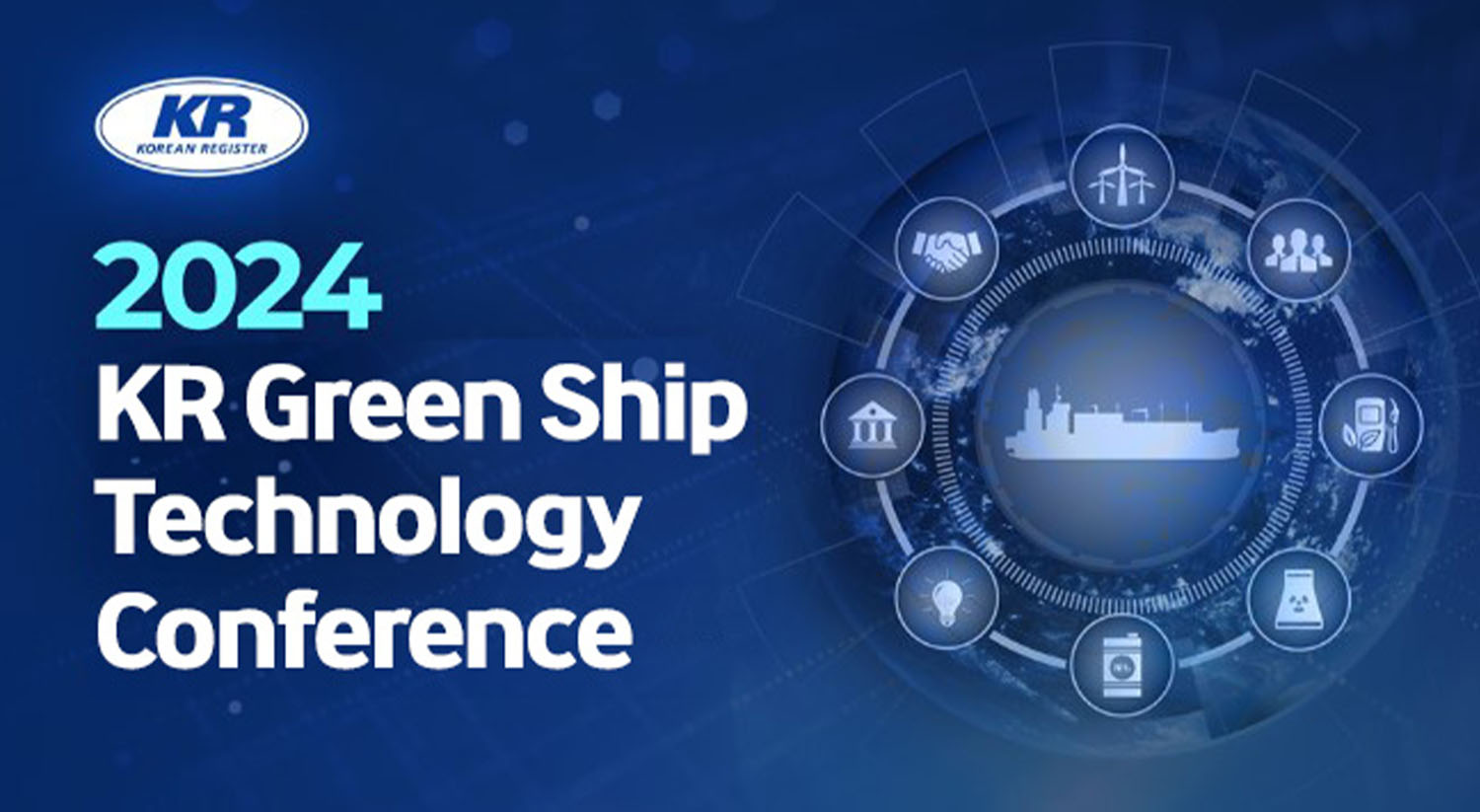
On November 28, KR successfully hosted the 'KR Green Ship Technology Conference 2024' at The Plaza Hotel in Seoul, addressing pivotal challenges in maritime decarbonization.
Centered around the theme, 'Time for Action Towards Green Shipping', the conference drew significant attention amid intensifying GHG regulations from the International Maritime Organization (IMO) and European Union (EU). The event showcased innovative strategies and technologies for reducing maritime sector emissions.
The conference featured two comprehensive sessions and a panel discussion, highlighting KR's commitment to supporting the industry's transition towards sustainable shipping:
Session 1: GHG Reduction Technologies and Strategies
▶ KR's Decarbonization Support Services for Vessels
▶ Alternative Fuel Engine Development Towards 2050 Carbon Neutrality
▶ Fuel Consumption Analysis Tools Based on Maritime
Environment and Vessel Operation Data
▶ Performance Prediction of Ship Energy Saving Technologies
Using CFD
Session 2: Green Alternative Fuel Transition
▶ HMM's Net-Zero Strategy
▶ GHG Regulation Preparedness and Green Fuel Engine Development
▶ Marine Molten Salt Reactor (MSR) Technology Development
The panel discussion followed the sessions, gathering experts from KR, the Ministry of Oceans and Fisheries, and Korea Planning & Evaluation of Industrial Technology (KEIT) under the theme ‘Actionable Decarbonization Plans’.
KIM Daeheon, Executive Vice President of KR’s R&D Division, stated, "This conference provided an invaluable platform to discuss practical solutions for GHG regulations and green alternative fuel transitions. KR remains committed to collaborating with the industry stakeholders to create a sustainable future."
MacNet Strategic Seminar Discusses CCUS
Development Status and Challenges
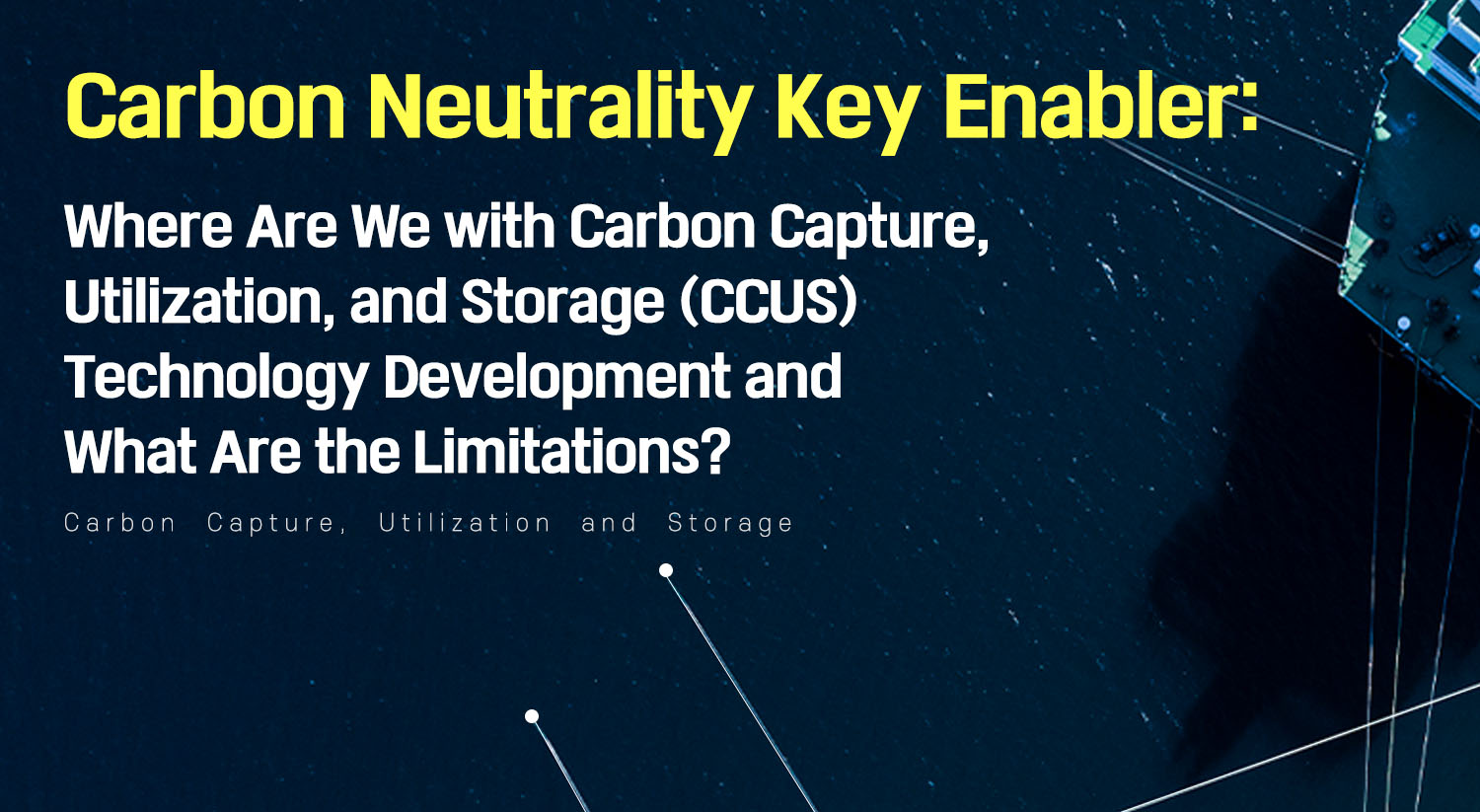
On November 6, The Maritime Cluster Networking in Korea (MacNet) held the strategic seminar-Ⅱ titled “Carbon Neutrality Key Enabler: Where Are We with Carbon Capture, Utilization, and Storage (CCUS) Technology Development and What Are the Limitations?”.
Organized by MacNet with support from Busan Metropolitan City and KR, the seminar provided a platform to discuss CCUS technology development as a key enabler for achieving Net- Zero carbon emissions by 2050. It also focused on exploring strategies for collaboration with related industries.
The event comprised three sessions:
Session 1
▶ Overview of International CCUS Projects and Strategies for
Demonstrating CCUS Using Donghae Gas Fields
▶ Cross-Border CCS Strategies under International Regulations
Session 2
▶ Strategies for Securing Overseas Carbon Storage Sites for Carbon Neutrality
▶ Greenhouse Gas Reduction Potential and Economic Feasibility
Analysis of OCCS
Session 3
▶ A comprehensive panel discussion on the topics from Sessions 1 and 2
As nations globally work toward achieving complete decarbonization
by 2050, CCUS—a technology to capture and store carbon while
converting it into valuable resources—is gaining significant attention.
The International Energy Agency predicts that CCUS will contribute
approximately 18% to carbon neutrality efforts, making it an essential
tool in combating climate change.
Despite active CCUS research and development, challenges such as economic feasibility and unforeseen technical issues remain barriers to commercialization.
A MacNet representative highlighted that the seminar successfully identified collaboration opportunities across industries to overcome technical challenges and drive advancements in CCUS, emphasizing the importance of sustained cooperation in the future.
